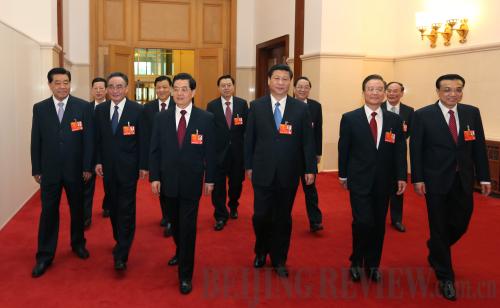|
 |
|
GENERATION SHIFT: State and Party leaders (from left, front) Jia Qinglin, Wu Bangguo, Hu Jintao, Xi Jinping, Wen Jiabao and Li Keqiang, (from left, back) Zhang Gaoli, Liu Yunshan, Zhang Dejiang, Yu Zhengsheng and Wang Qishan attend the opening meeting of the First Session of the 12th National People's Congress in Beijing on March 5 (LAN HONGGUANG) |
The First Session of the 12th National People's Congress (NPC), China's top legislature, ended in Beijing on March 17 after a successful leadership transition.
Xi Jinping, General Secretary of the Communist Party of China (CPC) Central Committee and Chairman of the CPC Central Military Commission, was elected president and chairman of the Central Military Commission of the People's Republic of China at this NPC session. Zhang Dejiang was elected chairman of the NPC Standing Committee and Li Keqiang, premier of the State Council, China's cabinet.
Meanwhile, the 12th National Committee of the Chinese People's Political Consultative Conference (CPPCC) held its first plenary session on March 3-12. Members of the national advisory body elected Yu Zhengsheng as its chairman.
Analysts believe that the power transition promises forceful leadership, as well as organizational and personnel guarantees, for China's development over the next five years.
"The new leadership is a group that is well-educated and has experienced the entire process of reform and opening up," said Xie Chuntao, a professor at the Party School of the CPC Central Committee. "It will further push forward the implementation of major policies and principles proposed during the 18th CPC National Congress, which was held last November and established the new CPC leadership."
The 18th CPC National Congress said that at this stage, the CPC's task should be ensuring the construction of a moderately prosperous society in all respects by 2020, placing high importance on the next five years.
A pragmatic generation
Xie observed that the new generation of leaders have shown "capacity in controlling overall situations and tackling complicated emergencies," and "are well prepared for challenges and ready to seize opportunities."
All of them boast rich governing experience, having climbed the Party cadre echelon step by step.
Born in the 1940s and 1950s, the new leaders generally hold a realistic attitude of the world and China's development.
"They grew up in a totally different historic and social environment from their predecessors, which will, to a great extent, lead to a different conceptual approach to administration," said Dai Yanjun, another professor at the Party School of the CPC Central Committee.
Unlike the founding fathers of the People's Republic of China and previous generations of leading officials who grew up during wartime, the new leaders, mostly born around the founding of the new China, grew up in peacetime.
This allowed them to have a relatively complete and systematic education in mainstream socialist ideology, shaping their worldview and orientation of values.
The turbulent "cultural revolution" (1966-76) was a difficult time for them. Xi, Li, Zhang and several other newly appointed officials toiled in the countryside, when millions of teenagers were sent to live and work in rural areas.
"They had the experience of working hard in rural areas," Dai said. "They witnessed the ups and downs of China's development and the success of the national renewal. They are firm supporters of reform and opening up."
It was during their rural work period that Xi and Li received their first official titles. Acting as the Party branch secretaries of their respective production brigades in Shaanxi and Anhui provinces, they had the opportunity to learn administration at the grassroots level.
Zhang spent years working in a small village in northeastern Jilin Province, while Yu worked as a technician at a radio factory in the city of Zhangjiakou in north China's Hebei Province for several years.
| 